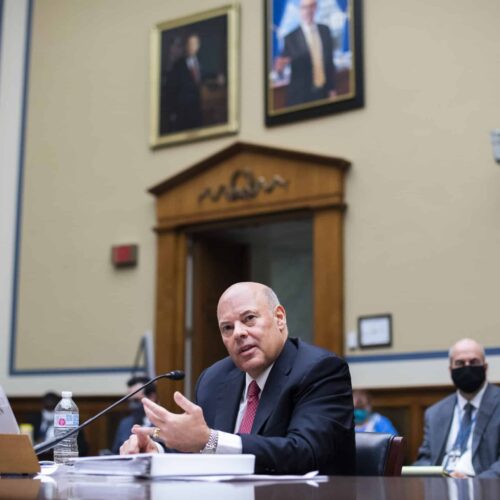Introduction
The U.S. Postal Service paid its top executives more in bonuses and perks last year than at any other point in the past decade, adding up to $370,622 in extra income for Postmaster General Louis DeJoy and four of his deputies, according to a Center for Public Integrity review of the agency’s financial disclosures.
DeJoy got a $75,000 performance bonus in fiscal year 2021, plus about $56,000 in other perks, which includes membership in two airline clubs, retirement counseling and financial planning services, according to the Postal Service’s newly released 10-K report. DeJoy earned this in addition to his $305,681 salary, the highest ever paid for the top job at USPS. In all, DeJoy earned about as much as President Joe Biden.
The typical annual pay for all postal service employees, meanwhile, was $51,150 in 2020 — the most recent year surveyed by the Bureau of Labor Statistics. The starting salary for an assistant city mail carrier was about $38,000 at the beginning of the year.
The generous executive compensation comes as the USPS continues to lose billions of dollars annually, and as mail carriers complain about rampant wage theft at the quasi-public agency. A Public Integrity investigation published in August found that hundreds of managers at post offices across the country have been caught illegally changing mail carriers’ time cards to show them working fewer hours than they did, resulting in lost pay.
While many of those cases predated DeJoy’s tenure, managers continue to change time cards to avoid paying overtime to hourly workers, according to dozens of mail carriers and private arbitration documents shared with Public Integrity.
Despite delivering a record number of packages to homes and businesses since the start of the pandemic, the Postal Service lost $4.9 billion in income and recorded $206 billion in debt and unfunded liabilities in fiscal year 2021.
“[DeJoy] seems like the last person who should be the recipient of an unprecedented salary increase and bonus,” said Noah Bookbinder, president of the government watchdog group Citizens for Responsibility and Ethics in Washington. Bookbinder pointed out that DeJoy intentionally slowed mail delivery as millions of Americans tried to vote by mail during the 2020 presidential election and resisted calls to sell stock he owned in a company that does business with the Postal Service, posing a conflict of interest.
In October, the Postal Service began slowing delivery of letters, bills and other first-class mail from three to five days in large swaths of the country — part of DeJoy’s plan to save the agency money. The agency has long wrestled with massive amounts of debt because federal law requires the Postal Service to prepay retiree pension and healthcare benefits.
The three major labor unions representing postal workers — the National Association of Letter Carriers, the National Rural Letter Carriers Association and the American Postal Workers Union — did not respond to Public Integrity’s request for comment on the 2021 bonuses.
The Postal Service’s board of governors, which hired DeJoy, sets his salary and determines his annual performance award, which is directly tied to meeting goals related to finances, employee performance and customer service, according to the report. The financial disclosure did not provide details about what those goals were for 2021, but DeJoy’s bonus was more than double the $30,650 targeted for the year.
The agency implied in its filing that this was unusual.
“Given our financial condition, any individual award is unlikely to exceed the target amount,” the disclosure stated.
The Postal Service’s board of governors, which plays a similar role as a corporate board of directors, did not explain why DeJoy received a higher-than-expected award this year. John Barger, a member of the board who leads its compensation committee, did not respond to questions from Public Integrity.
David Partenheimer, a spokesperson for USPS, said the executive bonuses reflect agency-wide improvements in line with DeJoy’s Delivering for America plan.
“In just the last fiscal year alone, the Postal Service saw a 5.3% increase in revenue, a smaller net loss and the strongest service performance for all mail categories since the previous year,” Partenheimer wrote in a statement shared with Public Integrity.
Partenheimer said that executive bonuses in 2021 were not the highest in 10 years, though he did not provide evidence to support his claim — which contradicts the numbers in the agency’s publicly reported financial disclosures.
Unlike federal cabinet officials, whose pay was capped at $221,400 this year, the board of governors at USPS can set the postmaster general’s salary up to 20% higher than the vice president’s. In 2021, that added up to $306,960, roughly what DeJoy earned. The board also has broad discretion in rewarding the postmaster general with perks and performance bonuses.
That’s because Congress passed a law in 2006 — the Postal Accountability and Enhancement Act — that raised the salary cap for USPS executives to provide them with more-generous pay. The thinking was that because the Postal Service operates like a business, it needs to better align executive pay with the private sector to attract top talent.
And just like many large private-sector companies, the Postal Service has been cited repeatedly by the U.S. Department of Labor for illegally underpaying its workers, with few consequences. The Postal Service was cited by the federal government 1,150 times for underpaying letter carriers and other employees between 2005 and 2020, according to Labor Department data obtained through a Freedom of Information Act request.
Partenheimer, the USPS spokesperson, said that the agency does not condone supervisors making improper changes to employee time cards, and that it takes such allegations seriously. “This position is messaged to the postal workforce directly from postal leaders,” he wrote in a statement.
Mail carriers who have struggled to get paid for all their work said it has impacted their mental health and their work relationships. Some have had to dip into their retirement savings.
“We are depending on that money,” Nancy Campos, a mail carrier in Midland, Texas, told Public Integrity earlier this year. “When you get shorted, it’s the most horrible feeling.”
Alexia Fernández Campbell is a senior reporter at Public Integrity. She can be reached at acampbell@publicintegrity.org. Follow her on Twitter at @AlexiaCampbell.
Help support this work
Public Integrity doesn’t have paywalls and doesn’t accept advertising so that our investigative reporting can have the widest possible impact on addressing inequality in the U.S. Our work is possible thanks to support from people like you. Donate now.
Read more in Inequality, Opportunity and Poverty
Cheated at Work
The holiday rush is here. Will mail carriers get paid for all their work?
The USPS has a habit of shorting workers on pay, private arbitration awards show.




Join the conversation
Show Comments